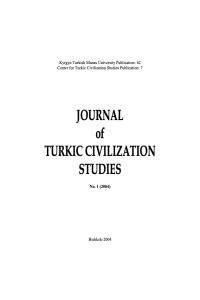Öz
The scientific activities observed within the borders of the Ottoman Empire throughout the six centuries of its history displayed a unique course of development. Although the Ottomans had shared many mutual elements with the other Islamic societies remaining outside of the Ottoman Empire, from the viewpoint of historical heritage and tradition, they also had some differences due to the geographical location, administration of the state and the dynamism of the society. Thus, Ottoman science had an innovative attribute from the viewpoint of the developments experienced, even though it shared a lot with the Islamic world outside the Ottoman lands from the aspect of its sources. Ottoman scientific tradition was initially formed under the influence of the experience of the earlier Islamic centers of science and culture. However, after a short period of time, Ottoman science reached a point where it could influence the old centers of science and culture and serve as an example to them. On the other hand, this innovative character of the Ottomans was emphasized by the fact that as of the seventeenth century the influences of Western science gradually appeared in the Ottoman world and began to influence the other Islamic countries. These developments brought the Ottomans, who represented the Islamic world as a whole, to a point of constituting a unique synthesis between Islam and the modern West.
Anahtar Kelimeler
Kaynakça
- Orhan Koloğlu, Halka Doğru Bilim, TBTK (Turkish Society for History of Science) (İstanbul, 1997).
Ayrıntılar
| Birincil Dil | Türkçe |
|---|---|
| Konular | Tarih Sosyolojisi |
| Bölüm | Araştırma Makalesi |
| Yazarlar | |
| Yayımlanma Tarihi | 30 Haziran 2004 |
| Yayımlandığı Sayı | Yıl 2004 Cilt: 1 Sayı: 1 |
Journal of Turkic Civilization Studies © 2022 by TUAUM is licensed under Attribution-NonCommercial 4.0 International
Journal of Turkic Civilization Studies by TUAUM is licensed under Attribution-NonCommercial 4.0 International


